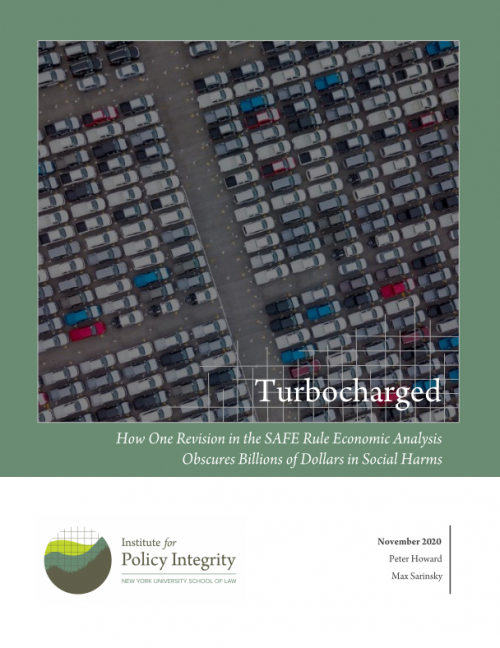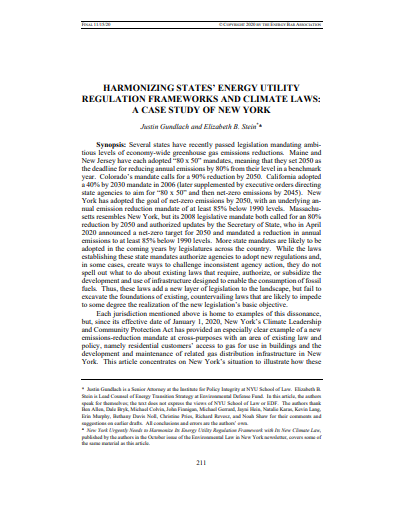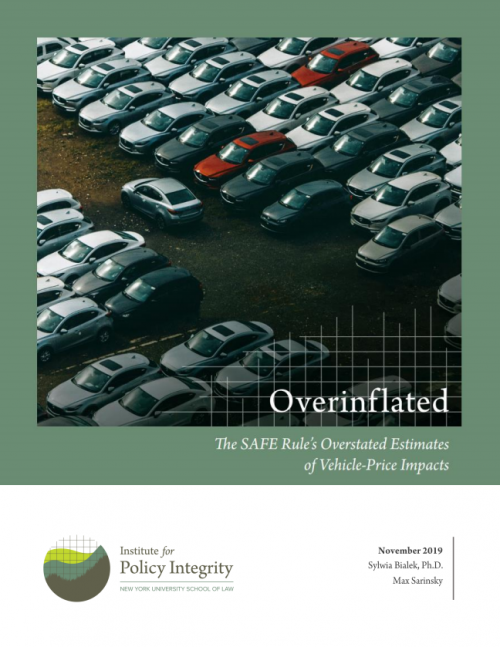-
Ninth Circuit Affirms Injunctions of Public Charge Rule
The U.S. Court of Appeals for the Ninth Circuit ruled that the Department of Homeland Security’s “Public Charge” rule is both contrary to statute and arbitrary and capricious. Our amicus brief in the case played a key role in shaping the decision. The Ninth Circuit adopts our core arguments, emphasizing how Homeland Security fails to assess the rule's harms and draws conclusions that are contradicted by the record.
-
Comments and Reply Comments on FERC’s Carbon Pricing Policy Statement
The Federal Energy Regulatory Commission proposed a policy statement on carbon pricing in organized wholesale electricity markets. We submitted comments encouraging FERC to strengthen its proposal by making specific clarifications. We later submitted reply comments addressing points made by other commenters and providing further guidance on how FERC can improve its final policy statement.
-
Comments to FERC on Clean Resources’ Participation in NYISO’s Capacity Market
Complainants in an ongoing proceeding ask that the Federal Energy Regulatory Commission (FERC) make changes to the New York Independent System Operator (NYISO)'s capacity market that would impose offer floors on all capacity market bids by state-supported renewables. We submitted comments showing why the complaint's arguments and evidence fall short of the legal standards required for FERC to make the findings and grant the relief requested.
-
Turbocharged
How One Revision in the SAFE Rule Economic Analysis Obscures Billions of Dollars in Social Harms
This report is part of a series that documents how the assumptions underlying The Safer Affordable Fuel Efficient (SAFE) Vehicles Final Rule for Model Years 2021–2026 Passenger Cars and Light Trucks are skewed to make the rule look less harmful than it actually is. In this report, we focus on the rule’s estimate of vehicle sale price elasticity, which substantially inflates the rollback’s effect on new vehicle purchases.
-
Comments to New York DEC on the Value of Carbon
New York State's Department of Environmental Conservation (DEC) has adopted a damage-cost approach to valuing carbon dioxide pollution. We submitted comments on the DEC's draft guidance supporting the policy. Our comments also raise points about the appropriate use of discount rates, calculating damages for other greenhouse gases, inclusion of co-benefits in analysis, and further considerations for a marginal abatement cost approach.
-
Amicus Brief in Ninth Circuit on Montana Coal Mine Expansion
The expansion of the Bull Mountains Mine project in Montana would allow for an increase in coal production likely resulting in more than $9 billion in climate damages. We filed an amicus brief in the U.S. Court of Appeals for the Ninth Circuit criticizing the Office of Surface Mining’s analysis of the project, which fails to monetize climate impacts using the social cost of carbon. We explain that the project’s full economic benefit is, at most, just one-third of its expected climate costs.
-
Comments to BLM on December 2020 Lease Sale in Colorado
A proposed oil and gas lease sale in Colorado would offer over 45,000 acres in areas valuable for recreation, wildlife, environmental conservation, and tourism. We submitted comments explaining how the Bureau of Land Management’s (BLM) environmental assessment neglects its duties to manage public lands for multiple uses and consider more limited leasing scenarios.
-
Harmonizing States’ Energy Utility Regulation Frameworks and Climate Laws
A Case Study of New York
Unless the institutional framework and laws pertaining to fossil fuels are modified appropriately, decarbonization efforts will likely be stymied by confusion and related opportunities for opposition. This article, published in the Energy Law Journal, aims to start a wider conversation about the process of conforming existing energy law with novel, climate-oriented legislation. We concentrate on New York’s situation to illustrate how these tensions can manifest and what might be done to address them.
-
Overinflated
The SAFE Rule’s Overstated Estimates of Vehicle-Price Impacts
This report is part of a series that documents how the assumptions underlying The Safer Affordable Fuel Efficient (SAFE) Vehicles Final Rule for Model Years 2021–2026 Passenger Cars and Light Trucks are skewed to make the rule look less harmful than it actually is. In the SAFE Rule, the Environmental Protection Agency and the National Highway Traffic Safety Administration have significantly rolled back the greenhouse gas emission and fuel economy standards for light vehicles established under the Obama Administration. This report highlights three critical problems in the agencies’ assumptions about vehicle prices.











